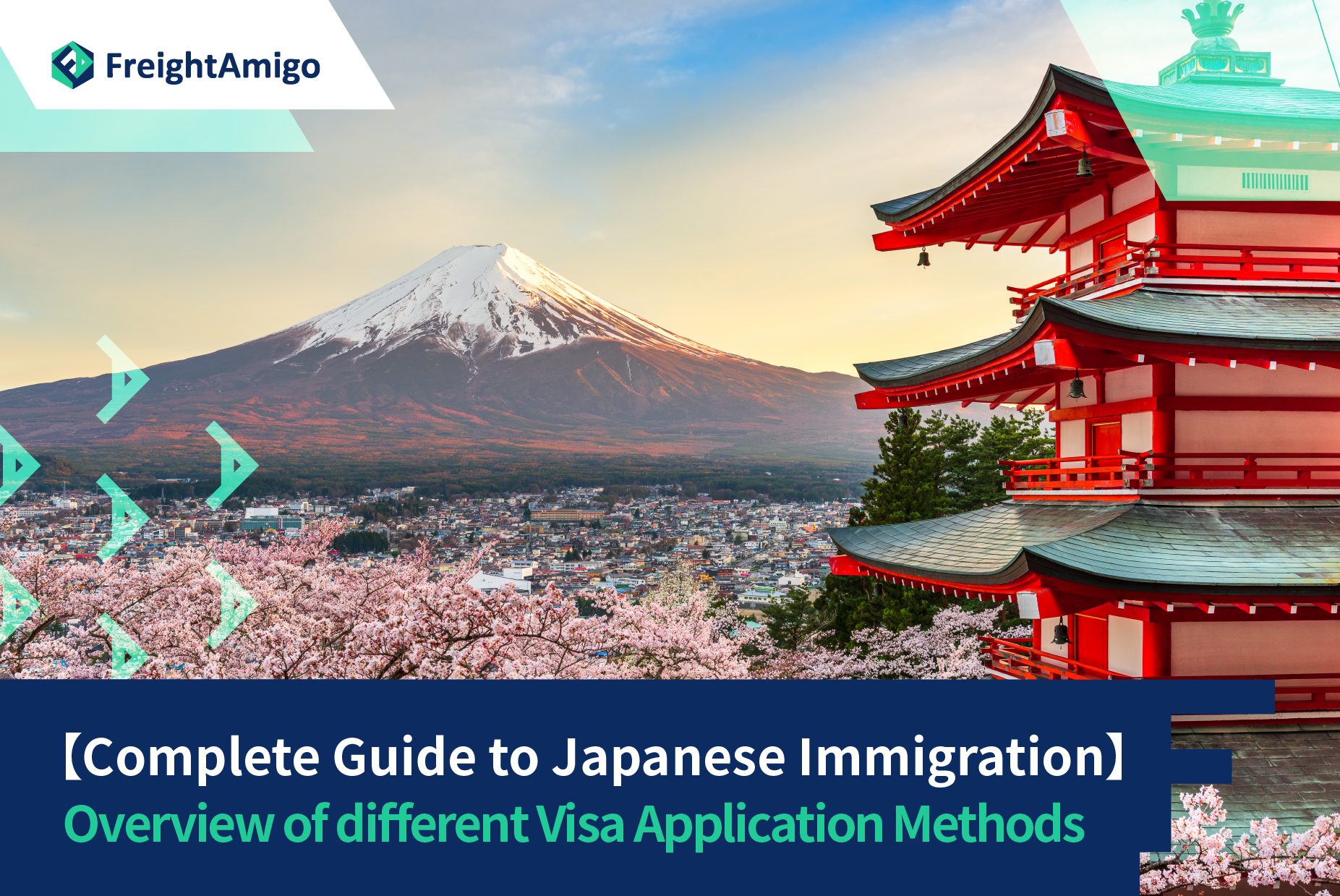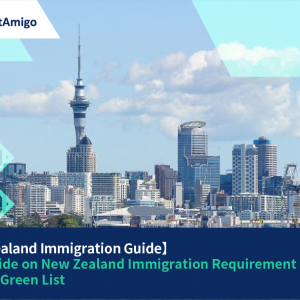Author Name: Tiffany Lee – Marketing Analyst at FreightAmigo
As one of the most popular travel destinations for Hong Kong people, Japan has naturally become one of the most desired places for young Hong Kong residents to immigrate to. So, what are the immigration requirements for Japan, and what avenues are available for Hong Kong residents to obtain Japanese citizenship? Japan offers various types of visas to accommodate different purposes of visits. FreightAmigo has organized the following information on multiple types of Japanese visas.
Immigrating to Japan – Work Visa
One option for immigrating to Japan is to apply for a work visa, specifically the “Designated Activities Visa” (就労ビザ), which is considered a beginner’s choice. This visa covers 14 industries, including education, arts, business, law and accounting, healthcare, research, and more. The most commonly applied for industry is the “Technical/Humanities/International Services” industry, which offers various opportunities for hiring foreigners with relevant qualifications and Japanese language proficiency (at least level N2), such as in overseas trade, IT, translation, finance, and accounting.
5 Ways Immigrating to Japan
Visa Type | Application Requirements | Required Documents | Visa Validity |
Tourist Visa | Valid passport | Visa application form | With the validity period depending on the travel plan, usually ranging from 15, 30, to 90 days |
Student Visa | Certificate of eligibility for student status from a Japanese school | Visa application form | With the validity period depending on the study period, with a maximum validity of up to 2 years. |
Working Visa | Offer of employment in Japan from a Japanese employer | Visa application form | with the validity period depending on the work period, with a maximum validity of up to 5 years |
Marriage Visa | Spouse is a Japanese citizen or has a valid residence status in Japan | Visa application form | with the validity period depending on the work period, with a maximum validity of up to 5 years |
Business Visa | Plan to conduct business in Japan | Visa application form | with the validity period depending on the work period, with a maximum validity of up to 5 years |
Work Visa – Application Requirements
To apply for a work visa, one must first be hired by a Japanese company and provide various documents, such as the company profile, employment letter, work history, and language proficiency certificate. As the process can be complicated, many young people under 30 first apply for a Japanese working holiday, find a job locally, and then apply for a work visa after gaining the employer’s trust.
The basic requirements for a work visa are to engage in management, education, arts, business, law and accounting, healthcare, research, nursing, or technical skills (such as a chef or pilot), obtain a Certificate of Eligibility (COE), be hired by a Japanese company, and provide various documents, such as an employment letter, company profile, job experience, and language proficiency certificate (at least level N2).
Work Visa- Length of Stay
The validity period of Japan’s technical, humanities, and international business visas is determined by the Japanese Ministry of Justice based on the applicant and their company’s situation and can last up to five years, three years, one year, six months, or three months. Typically, these visas have a validity period of at least one year, but if the Japanese government deems it necessary to frequently evaluate the applicant’s eligibility for the visa, its validity period may be less than a year.
Before the visa expires, the applicant must renew their visa at the Immigration Bureau. Failure to renew the visa may result in the need to leave Japan before the visa expires or face deportation.
Work Visa – Can Family Members Apply for a Dependent Visa?
To allow you to work in Japan with peace of mind, your spouse and children can apply to come to Japan as family members. If they meet the relevant conditions, they can also work in Japan.
In addition, after living in Japan for more than 10 years, you can apply for permanent residency. After obtaining permanent residency, your spouse and children can also apply for the “Spouse of a Permanent Resident Visa” and continue to reside in Japan.
Immigrating to Japan – Highly Skilled Visa
The Highly Skilled Visa in Japan is a visa category established for individuals with exceptional professional skills and experience. Its purpose is to attract internationally recognized professionals to work and live in Japan and contribute to the country’s economic and social development.
Highly Skilled Visa – Application Requirements
The Highly Skilled Visa in Japan is a work visa designed for high-skilled and talented individuals. Applicants must have an annual income of over 3 million Japanese yen (approximately HKD 200,000) and score 70 points or more on the Japanese government’s Highly Skilled Foreign Professional Point System. The point system has three basic scoring categories, including educational background, work experience, and annual income and age. In addition, 10 special bonus criteria have been established, such as graduating from designated universities like the University of Hong Kong or the Hong Kong University of Science and Technology, or passing the Japanese Language Proficiency Test (JLPT) N1.
Highly Skilled Visa – Length of Stay
Individuals holding a Highly Skilled Visa in Japan can stay for a maximum of five years. After that, they can also apply to extend the validity of their visa. Furthermore, applicants only need to reside and work in Japan for three years before they can apply for permanent residency. If an applicant scores 80 points or more on the Highly Skilled Foreign Professional Point System, they can apply for permanent residency after just one year.
Immigrating to Japan – Student Visa / Spouse Visa / Business Manager Visa
Student Visa: Many universities in Japan offer courses taught in English, even for foreigners who do not speak Japanese. The universities also provide practical or business Japanese language courses to help foreigners learn Japanese and better adapt to life and work in Japan. By studying at a Japanese university, applicants can enrich themselves and improve their professional skills and language ability within a few years. This can make it easier for them to find employment and apply for a work visa, as well as better adapt to Japanese society and culture.
Spouse Visa: If a foreigner marries a Japanese national, they can apply for a spouse visa to live in Japan. The validity period of this visa ranges from six months to five years and allows the holder to work in Japan without any significant work restrictions. If the foreigner has lived in Japan for one year and has been married for three years, they can apply for permanent residency. If they wish to apply for Japanese citizenship, they must have lived in Japan for at least three years.
Business Manager Visa: This method is also known as “investment immigration.” To apply for a Business Manager Visa, which is for those who want to start a business in Japan, applicants need to meet three conditions: have a personal bank account in Japan with a balance of over 5 million Japanese yen (approximately HKD 360,000), set up an independent office for their company in Japan, and hire two ormore full-time employees, preferably Japanese nationals. In addition, applicants must submit a company development plan to the Japanese government. If the business feasibility or sustainability of the company is not recognized by the Japanese government, the application for the Business Manager Visa will be rejected.
Immigrating to Japan – Permanent Residency
Applying for permanent residency allows an individual to have the right to permanently reside in Japan. Those who obtain permanent residency are called “permanent residents” and can live in Japan without Japanese nationality, passport, or voting rights. The application requirements are as follows:
- Must have good conduct, such as not having violated any Japanese laws or owed any taxes, etc.
- Must have sufficient assets or business skills to support oneself and pay for living expenses in Japan.
- Must have legally resided in Japan continuously for 10 years, including 5 years of residency with a work visa (excluding student visas, technical intern visas, and specific skills visa type 1, etc.). Those holding a spouse visa or highly skilled professional visa can also obtain permanent residency after one year of residing in Japan.
- Must not have been convicted of a crime and must fulfill obligations such as paying taxes, pension contributions, and medical insurance.
- The current visa’s validity period must be the longest period for that visa type. The validity period of Japanese visas varies, ranging from three months to five years for work visas, for example. If the applicant currently holds a work visa, the validity period of the visa must be five years.
- Must not be harmful to public health, such as having a severe infectious disease, etc.
Naturalization vs Permanent Residency
The naturalization system is a system that allows foreign nationals to obtain Japanese citizenship. After naturalization, the individual’s nationality becomes “Japanese”, and they can enjoy the right to vote and be elected in national or local elections, and obtain a Japanese passport. The permanent residence system allows foreign nationals to have the right to reside permanently in Japan, but without Japanese citizenship, a passport, or the right to vote.
Differences:
Naturalization involves giving up one’s original nationality and acquiring a new nationality, while permanent residence allows one to retain their original nationality.
Naturalized citizens enjoy the rights and responsibilities of Japanese citizens, such as the right to vote and the obligation to be called up for military service, while permanent residents may have some rights restrictions, such as the right to vote.
Naturalization requires completing a series of procedures and exams, such as language and citizenship knowledge tests, while permanent residence does not.
The application process for naturalization is more complicated and time-consuming, while the application process for permanent residence is relatively simple and fast.
FAQ
How can I find a job in Japan?
If you want to find a job in Japan, you can search for job openings through job search websites, social networks, job fairs, etc. You can also contact Japanese recruitment agencies or human resource companies for assistance.
Does speaking Japanese help with applying for a Japanese visa?
Although speaking Japanese is not a necessary requirement for applying for a Japanese visa, it can bring some benefits to the applicant. Firstly, if the applicant can communicate in Japanese with the embassy or consulate of Japan, this can enhance their credibility and reliability. Secondly, understanding and using Japanese is also necessary when filling out application forms and preparing application materials to ensure their accuracy and completeness. Additionally, if the applicant’s purpose of application is to learn Japanese or work in Japan, speaking Japanese can be seen as an advantage. Therefore, although not mandatory, speaking Japanese can bring more benefits to the visa application.
What is Japan’s tax system and how are taxes paid in Japan?
Japan’s tax system includes income tax, consumption tax, resident tax, corporate tax, etc. The main methods of tax payment are annual filing and withholding. Personal income tax and resident tax need to be self-reported and paid during annual filing, while consumption tax and corporate tax are usually paid by businesses and corporations on behalf of their customers or employees.
===
If you have any inquiries on logistics/supply chain, feel free to contact FreightAmigo now:
Chat with us online OR
Phone : +852 28121686
WhatsApp: +852 27467829










































